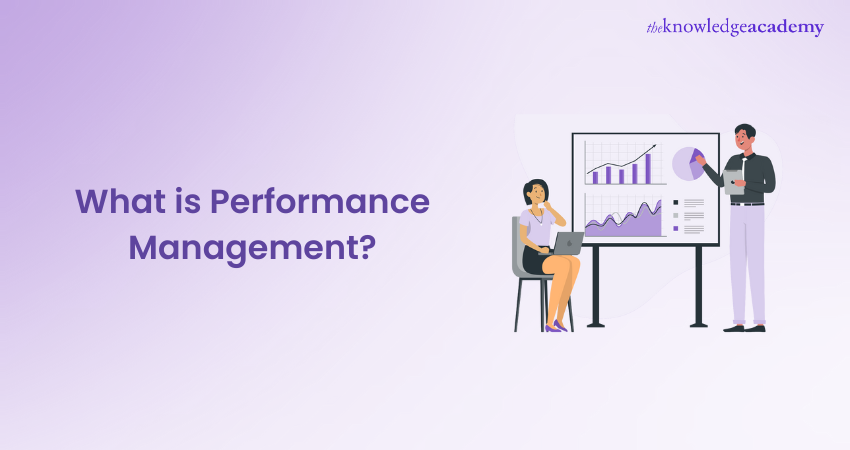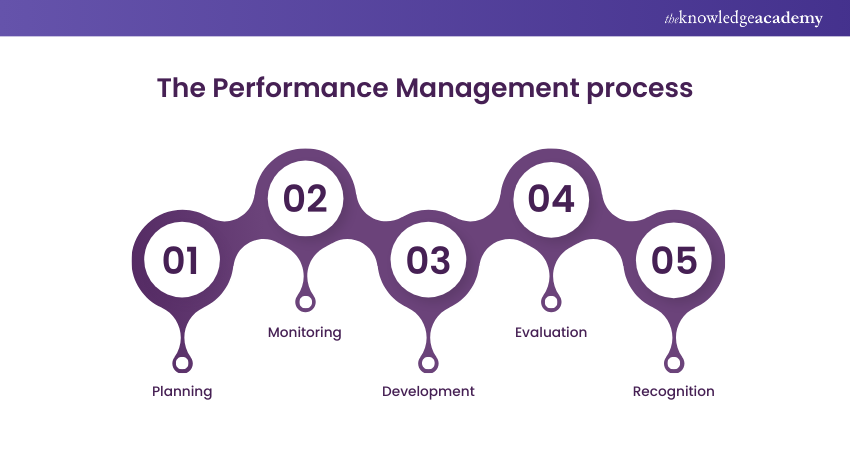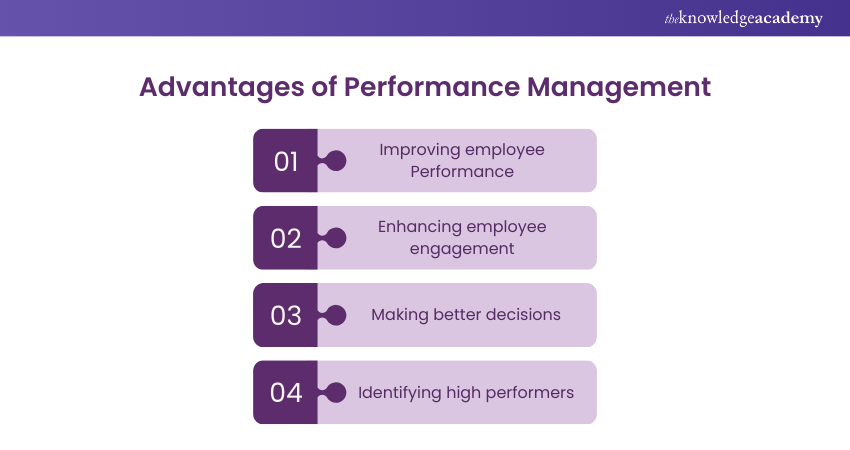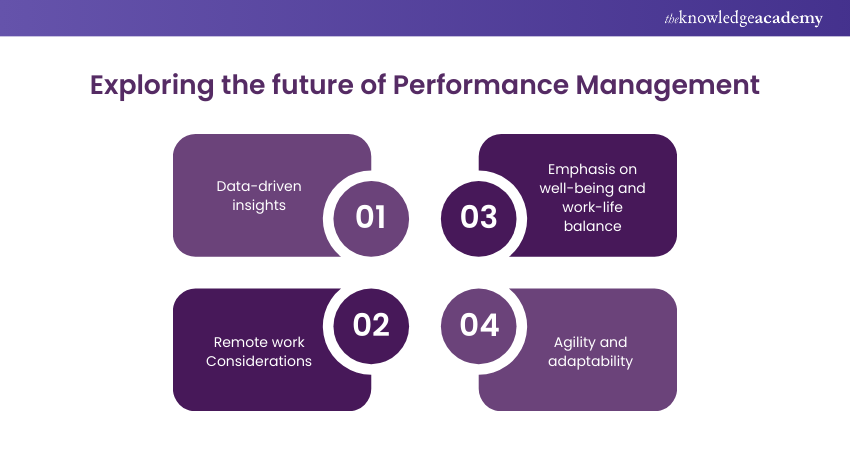We may not have the course you’re looking for. If you enquire or give us a call on +44 1344 203 999 and speak to our training experts, we may still be able to help with your training requirements.
Training Outcomes Within Your Budget!
We ensure quality, budget-alignment, and timely delivery by our expert instructors.

Employees are the backbone of any organisation. However, it is not always possible that they deliver the set targets effectively and efficiently. Thus, managing their performance from time to time is crucial to ensure that they are productive. This is why, organisations must learn What is Performance Management?
Performance Management involves the systematic process of managing employees to achieve set goals and objectives. It’s a method to ensure that employees’ work aligns with the organisation’s goals. So, wait no more; read this blog and learn What is Performance Management. Also, unlock the full potential of employees by exploring about the future of this evolving field.
Table of Contents
1) What is Performance Management?
2) Key elements of Performance Management
3) The Performance Management process
4) Best practices for Performance Management processes
5) Advantages of Performance Management
6) Exploring the future of Performance Management
7) Difference between Performance Management and Performance Appraisal
8) Conclusion
What is Performance Management?
The process of enabling employees to reach their full potential is called Performance Management. It involves setting clear expectations, providing feedback, and continuously supporting employees to improve their performance. Its importance lies in the following factors:
a) To ensure that individual goals align with the organisation's overall goals.
b) To help in identifying areas where employees can improve and provide training for development opportunities.
c) To motivate and engage employees in their work by regularly providing feedback and recognition.
d) To foster transparent dialogue between supervisors and staff members, resulting in improved rapport and comprehension.
Key elements of Performance Management
Performance Management is an ongoing process comprising numerous essential functions rather than a single occurrence. These functions work together in a cycle to support the following:
a) Employee development: Central to Performance Management is the continuous development of employees. This includes providing opportunities for training, mentorship and skill enhancement to empower individuals to grow within their roles.
b) Goal setting and alignment: Clear and measurable goals are established during the planning phase. These goals should align with the broader organisational objectives, ensuring that all employee's efforts contribute to the company's success.
c) Regular feedback: Effective Performance Management involves regular feedback sessions between managers and employees. Providing constructive feedback aids employees in comprehending their strengths, thereby nurturing a culture of perpetual learning and development.
d) Monitoring progress: Managers use performance data and metrics to assess how well employees are meeting expectations and to identify any potential obstacles.
e) Performance reviews: Formal evaluations, such as performance reviews or appraisals, provide a structured framework for assessing employee performance. These reviews often include discussions on achievements, areas for development, and goal-setting for the future.
f) Recognition and rewards: Acknowledging employee achievements is crucial for maintaining motivation and engagement. Acknowledgement can manifest through diverse channels, including verbal commendation, monetary rewards, career advancements, or alternative motivators.
Begin your journey to become a potential manager with our Introduction to Management – join today!
The Performance Management process
Now that you know What is Performance Management, you can establish a supportive and inspiring workplace atmosphere by grasping and applying specific Performance Management principles. Consequently, this procedure entails the subsequent stages:

1) Planning
The Planning Stage is the Critical Part of Performance Management and every other stage can't proceed without it. This includes defining specific, measurable goals and identifying Key performance indicators (KPIs) used to measure progress. During this stage, managers and employees discuss and agree upon the desired outcomes, ensuring that everyone is on the same page.
2) Monitoring
Once the performance objectives are set, the monitoring stage begins. This requires periodic evaluations and consistent communication to monitor the movement towards the specified targets. It is the manager who is in charge of the performance monitoring, by offering feedback, mentoring and necessary support.
These check-ins are important for identifying any barriers or difficulties that the workers may experience. This may also mean that they will help out to check that staff retain their goals in order to progress to these goals.
3) Development
Enhancement constitutes a pivotal facet of Performance Management, directing employees with the necessary resources for enhancing their performance. This can include opportunities for training, skill development, mentoring, or coaching. By investing in employee development, organisations can help employees to enhance their skills and capabilities.
4) Evaluation
Assessment involves a structured evaluation of an employee's performance in comparison to predetermined objectives and benchmarks. This stage often involves performance reviews or appraisals conducted by managers.
During these evaluations, managers provide feedback on performance, discuss strengths, and set new goals for the upcoming period. The evaluation further serves as a valuable opportunity for employees to receive recognition for their achievements.
5) Recognition
Recognition entails recognising and compensating employees for their accomplishments and valuable contributions to the organisation. Acknowledgement can be expressed through different means, such as verbal commendations, accolades, financial rewards, or career advancements. Recognising employees for their hard work and dedication boosts morale, reinforces positive behaviours, and encourages continued high performance.
Best Practices for Performance Management processes
Implementing some best practices enables organisations to establish an efficient Performance Management system that fosters employee development. Among these practices are:
1) Assessing current effectiveness
Before making any changes to the Performance Management process, organisations should conduct a thorough assessment of their current system. This involves gathering feedback from employees, managers, and other stakeholders to identify strengths and weaknesses. Organisations can make informed decisions about changes by understanding what is working well and where improvements are needed.
2) Selecting the appropriate approach
Performance Management is not a one-size-fits-all solution. Different organisations might require different approaches based on their culture, size, and industry. It is essential to tailor this management process to suit the specific objectives of an organisation. This can involve customising performance metrics, goal-setting methods, and feedback mechanisms to align with organisational goals.
3) Training and engaging managers
Performance Management is one of the key responsibilities of managers. Advising and aid to managers on how to offer feedback, and establish measurable goals is certainly vital. In addition to having knowledgeable managers, this approach requires the managers to have sufficient skills to conduct productive performance discussions and guide their team’s development.
4) Embracing continuous Performance Management
Embracing continuous Performance Management allows for more frequent feedback and discussions between managers and employees. This approach enables timely adjustments and improvements. This, in turn, fosters a culture of ongoing learning and development. Frequent conversations guarantee employees receive prompt performance feedback, empowering them to enact essential enhancements and sustain their motivation.
5) Establishing a formalised system
Having a formalised Performance Management system in place is crucial for consistency and fairness. This includes establishing clear documentation, guidelines, and processes that outline expectations and procedures. A formalised system also ensures that all employees are evaluated using the same criteria, promoting fairness across the organisation. Additionally, having a structured system allows for easier tracking of employee progress, goal attainment, and areas for improvement.
Elevate your strategic acumen with our Senior Management Training - sign up now!
Advantages of Performance Management
Effective Performance Management brings forth numerous advantages. By implementing a robust system for managing employees’ performance, organisations can reap the following benefits:

1) Improving employee performance
Performance Management helps improve employee performance. When employees receive regular feedback and are provided with the necessary resources to succeed, they are more likely to excel.
Clear performance objectives and expectations set during the planning phase motivate employees to strive towards achieving their goals. As a result, organisations witness increased productivity and efficiency among their workforces.
2) Enhancing employee engagement
Engaged employees are vital assets to any organisation. Performance Management fosters employee engagement by creating a culture of open communication and collaboration. In addition, regular feedback sessions and performance discussions enable employees to feel valued and heard, leading to increased job satisfaction. Engaged employees are more committed to their work, thereby resulting in lower turnover rates.
3) Making better decisions
Performance Management provides organisations with valuable data and insights into employee performance. By gathering and scrutinising performance metrics and feedback, organisations can make well-founded decisions.
These insights help leaders identify Areas for Improvement, enabling them to allocate resources effectively and make strategic decisions. Whether it's identifying training needs or adjusting workloads, Performance Management data serves as a valuable tool for driving organisational success.
4) Identifying high performers
Through regular evaluations and assessments, managers can pinpoint individuals who consistently exceed expectations and deliver exceptional results. Recognising these top performers is essential for employee morale and motivation.
Furthermore, identifying high performers allows organisations to provide targeted development opportunities and career advancement paths. This not only rewards top talent but also encourages others to strive for excellence.
Exploring the future of Performance Management
As organisations adapt to new ways of managing their workforce, the following trends are emerging in the Performance Management domain:

1) Data-driven insights: As Data Analytics Tools become more accessible, Performance Management is increasingly driven by data. Organisations can leverage performance data to gain valuable insights into employee productivity, engagement, and performance trends. Data Analytics can empower organisations to recognise patterns, trends, and opportunities for enhancement, fostering better-informed decision-making processes.
2) Remote work considerations: The surge in remote work has significantly influenced the approach to Performance Management. As more employees work remotely or in hybrid models, Performance Management processes might need to change. Hence, its future might incorporate strategies for effectively managing remote teams, ensuring that employees remain engaged and connected.
3) Emphasis on well-being and work-life balance: Organisations are recognising the importance of supporting employee health and mental well-being for overall performance and productivity. Performance Management processes can also include measures to assess and support employee well-being, like flexible work arrangements and stress management initiatives.
4) Agility and adaptability: As the business environment continues to evolve rapidly, Performance Management might need to be agile and adaptable. Organisations must also be prepared to adjust their performance assessment strategies in response to changing industry trends and workforce dynamics.
Difference between Performance Management and Performance Appraisal
While Performance Management and Performance Appraisal are related, they serve different purposes. A few of their differences are discussed below:
|
Feature |
Performance Management |
Performance Appraisal |
|
Definition |
A continuous process focused on improving organisational performance. |
A periodic evaluation of an employee's past performance. |
|
Scope |
Broad, includes setting objectives, reviewing progress, providing feedback, and development. |
Narrow, primarily focused on evaluating employee performance. |
|
Frequency |
Ongoing throughout the year. |
Typically conducted annually or semi-annually. |
|
Approach |
Forward-looking, with an emphasis on improvement and development. |
Retrospective, assessing past performance against set standards. |
|
Focus |
On aligning individual goals with organisational goals and strategies. |
On assessing individual employee achievements and behaviours. |
|
Feedback |
Regular feedback for development. |
Feedback provided mainly during appraisal meetings. |
|
Participant Involvement |
Involves both managers and employees in a collaborative process. |
Often seen as a top-down process where managers evaluate employees. |
|
Outcome |
Development plans, coaching, and performance improvement. |
Ratings, rankings, or qualifications of past performance. |
Conclusion
Performance Management plays a vital role in organisational success. By learning about “What is Performance Management?” and integrating effective processes, businesses can align employee performance with company goals and foster ongoing enhancement.
Gain a competitive edge with our comprehensive Introduction to Supplier Management - register today.
Frequently Asked Questions
Upcoming Business Skills Resources Batches & Dates
Date
 Managing Remote Teams
Managing Remote Teams
Fri 31st May 2024
Fri 19th Jul 2024
Fri 20th Sep 2024
Fri 29th Nov 2024









 Top Rated Course
Top Rated Course



 If you wish to make any changes to your course, please
If you wish to make any changes to your course, please


